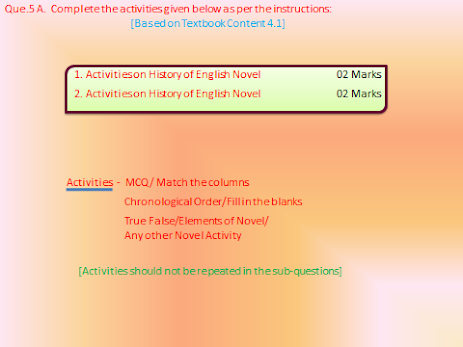4.1 History of Novel
The activities on the chapter 'History of Novel' can be set as follows-
Activities based on History of Novel
From section four, the chapter 4.1 History of Novel is a description of the origin and development of the novel. Novel is the most popular famous literary genre. It describes the growth and evolution of this genre and also lists names of many masterpieces and their writers.
The eighteenth century has gifted the English literature two new forms- The Periodical Essay and The Novel. Novel got the spirit of eighteenth century as intellectual , sentimental and realistic plane and tried to instruct the readers. Since the time of origin, the novel has been growing and gaining its popularity.
Activities-
1. The eighteenth century has gifted the English literature two new forms........
a. Poetry and Drama b. Short story and Drama c. The Periodical Essay and Novel d. Greek Romances and Novel
2. The Periodical Essay and Novel emerged as new forms in.......century.
a. Sixteenth b. Seventeenth c. Eighteenth d. Nineteenth
3. Today ...................is recognized as the most dominant literary genre.
a. Drama b. Novel c. Poetry d. Greek Romances
4. Novel is written in the form of .......
a. prose b. verse c. rhythm
5. The word 'novel' is derived from the word.........
a. novelist b. novella c. new d. narrative
6. The word 'novella' means.......
a. short b. long c. new d. narrative
7. Novel creates a picture of ........of that time.
a. forest b. city c. society d. characters
8. ............makes life easier to understand than drama and poetry.
a. Novel b. Short Story c. Greek Romances d. Newspaper
9. The novel has a history of about.......years.
a. three thousand b. two thousand c. four thousand d. five thousand
10. Greek Romances existed in between.........century.
a. 2 and 6 b. 3 and 5 c. 1 and 4 d. 6 and 9
11. ...........is the world's first novel.
a. Tale of Genji b. Don Quixote c. Ecologues d. Oroonoku
12. The Spnish writer........created the first European novel.
a. Geoffrey Chaucer b. Miguel De Cervantes c. Virgil d. Aphra Behn
13. The novel 'Don Quixote' was published into ........parts.
a. two b. three c. four d. five
14. In England, novel originated as a literary form after........
a. 1745 b. 1740 c. 1840 d. 1845
15. .........people regarded novel as respectable reading material.
a. Old b. educated c. illiterate d. young
16. There are ............elements essential of 'Novel' or 'Novella'.
a. seven b. five c. six
17. Theme is the .............in the novel which can be expressed in a nutshell.
a. central idea b. conclusion c. introduction
18. In the first half of the 20th century, a cult of ............ magazines' became popular.
a. amazing b. pulp c. powerful
19. Space travel, time travel and extraterrestrial life may be seen in ..............fiction.
a. historical b. gothic c. science
20. The word 'picaresque' is originated from the Spanish word.......
a. novella b. gothic c. picaro
State whether the following statements are true/false. Correct the false statements and rewrite them.
1. The eighteenth century has gifted Drama and Novel.
False-The eighteenth century has gifted 'The Periodical Essay' and 'Novel'.
2. The novel is a long narrative fiction.
True
3. The novel is written in the form of verse.
False-The novel is written in the form of prose.
4. The word 'novel' is derived from Spanish word 'novella'.
True.
5. The word 'novella' means 'new'.
True.
6. Drama and poetry make life easier to understand than novel.
False-Novel makes life easier to understand than drama and poetry.
7. Greek Romances included stories of ideal love and marvellous adventures.
True.
8. Ecologues is a creation by Virgil.
True.
9. Murasaki is the world's first novelist.
True.
10. The middle class was attracted to newspaper and magazine in 18th century.
True.
11. The middle class in 18th century was interested in the romantic features.
False-The middle class in 18th century denied romantic features.
12. Industrial revolution had given risen to middle class.
True.
13.Aspirations and longings of middle class and lower class seemed to be presented in the novel.
True.
14. The word 'epistolary' derives from the Latin word 'epistola'.
True.
15. The surface and symbolic meanings are similar in Allegorical novel.
False-The surface and symbolic meanings are different in Allegorical novel.
Pick out the odd element from the group.
1. Arun Joshi, Vikram Seth, Graham Greene, Kiran Nagarkar
2. Place, Period, Theme, Climate, Lifestyle
3. Theme, Plot, Character, Novella
4. Billy Budd, The Turn of The Screw, Pearl, Joseph Conrad, Death In Venice
Match the columns:
A |
|
|
|
|
|
|
|
|
|
A |
|
|
|
|
|
|
|
|
|
A | B |
|
|
|
|
|
|
|
|
A | B |
|
|
|
|
|
|
|
|
A |
|
|
|
|
|
|
|
| d. Gulliver’s Travels |
Other activities-
1. Write a note on stream of consciousness novel.
2. Write a note on style of novel.
3. Define a term 'Novella'.
4. Write about epistolary novel.
5. Indian tradition of novel.
6. Write a note on psychological novel.
7. Write a note on autobiographical novel.
8. Write a note on utopian/dystopian novel.
Compiled By-Dr. Salunkhe T. B.













No comments:
Post a Comment
Note: only a member of this blog may post a comment.